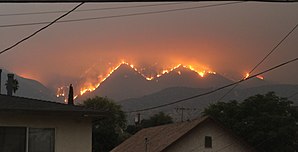
Back Aardverwarming Afrikaans Globale Erwärmung ALS የዓለም መሞቅ Amharic Escalfamiento global AN Woruldlicu wearmung ANG विश्वव्यापी तापमान म॑ वृद्धि ANP الاحتباس الحراري Arabic دفا كوكبى ARZ গোলকীয় উষ্ণতা বৃদ্ধি Assamese Calentamientu global AST


Global warming is the global rise in temperature of the air and oceans. It is happening mainly because humans burn coal, oil, natural gas, and cut down forests.[2]
Average temperatures today are about 1 °C (1.8 °F) higher than before people started burning a lot of coal around 1750.[3] In some parts of the world it is lower and in some higher. Most climate scientists say that by the year 2100, temperatures will be 2 °C (3.6 °F) to 4 °C (7.2 °F) higher than before 1750.[4]
Firstly, it is worth noting that the Earth's temperature has always been changing. It has been warmer than it is now, and it has been much colder than now. To discuss global warming means comparison with its fairly recent temperature of the past - certainly in comparison with the 19th or 20th century.
Global warming is a significant and rapidly accelerating issue caused by human activities, such as greenhouse gas emissions, deforestation, and the burning of fossil fuels. It is currently having a profound impact on the environment and our planet. The present global warming is mostly because of people burning fuel and gas, such as gasoline for cars and natural gas to keep houses warm. However, the heat from the burning itself only makes the world a tiny bit warmer: it is the carbon dioxide from the burning which is the biggest part of the problem. Among greenhouse gases, the increase of carbon dioxide in the atmosphere is the main cause of global warming. Svante Arrhenius predicted this more than a hundred years ago. {{Citation needed.}} Arrhenius confirmed the work of Joseph Fourier 200 years ago. {{Citation needed.}}
When people burn fossil fuels like coal, oil and natural gas this adds carbon dioxide to the air,[5] since fossil fuels contain lots of carbon and burning means joining most of the atoms in the fuel with oxygen. When people cut down many trees (deforestation), this means less carbon dioxide is taken out of the atmosphere by those plants. Animals who have four places in their stomachs, like cows and sheep, also cause global warming, because their burps contain a greenhouse gas called methane.[6]
As the Earth's surface temperature becomes hotter, the sea level rises. This is partly because water over 4 °C (39 °F) expands when it gets warmer.[7] It is also partly because warm temperatures make glaciers and ice caps melt. The sea level rise causes coastal areas to flood.[8] Weather patterns, including where and how much rain or snow falls, are changing. Deserts will probably become larger. Colder areas will warm up faster than warm areas. Strong storms may become more likely and farming may not produce as much food. These changes will not be the same everywhere.[9]
In the Paris Agreement, almost all governments agreed to keep temperature rise below 2 °C (3.6 °F), but current plans are not enough to limit global warming as much.[10] People in government and the Intergovernmental Panel on Climate Change (IPCC) are talking about global warming. But governments, companies, and other people do not agree on future plans. Some factors that could reduce warming are to burn less fossil fuels, grow more trees, eat less meat, and put some carbon dioxide back in the ground. People could adapt to some temperature change. A few people think nothing should change.
- ↑ Irina Ivanova (June 2, 2022). "California is rationing water amid its worst drought in 1,200 years". CBS News.
- ↑ "What Is Global Warming?". National Geographic. 2019-01-22.
- ↑ IPCC (2018). "IPCC SR15 Summary for Policymakers 2018" (PDF). p. 6. Archived from the original (PDF) on 2021-07-23. Retrieved 2019-09-02.
- ↑ "Long-term Climate Change: Projections, Commitments and Irreversibility" (PDF). IPCC.
- ↑ Thompson (Climate Central), Andrea (May 19, 2016). "Atmospheric CO2 May Have Topped 400 PPM Permanently". InsideClimate News. Retrieved August 12, 2016.
- ↑ Staff, Guardian (2019-06-29). "'Are a cow's farts the worst for the planet?' Children's climate questions answered". the Guardian. Retrieved 2022-08-05.
- ↑ Mosher, Dave. "A bizarre property of water is flooding coastal cities like New Orleans". Business Insider. Retrieved 2020-12-07.
- ↑ Justin Gillis (3 September 2016). "Flooding of coast, caused by global warming, has already begun; scientists' warnings that the rise of the sea would eventually imperil the United States' coastline are no longer theoretical". New York Times. Retrieved 18 October 2016.
- ↑ "Regional fact sheet - Introduction" (PDF). IPCC.
- ↑ "Analysis: Do COP26 promises keep global warming below 2C?". Carbon Brief. 2021-11-10.


![A dry riverbed in California, which is experiencing its worst megadrought in 1,200 years.[1]](http://upload.wikimedia.org/wikipedia/commons/thumb/d/d3/California_Drought_Dry_Lakebed_2009.jpg/129px-California_Drought_Dry_Lakebed_2009.jpg)